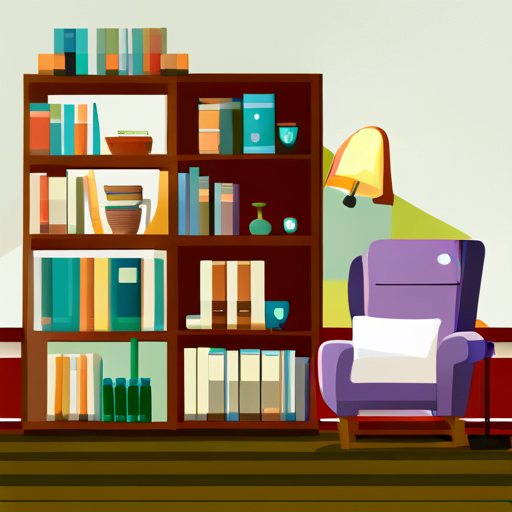Are you a book lover who dreams of having a well-stocked library in your home? Do you want to create a personal collection of books that reflects your interests and tastes? Building a home library can be a rewarding and enjoyable experience, but it can also be overwhelming.
With so many genres, authors, and formats to choose from, where do you start?
In this article, we will guide you through the process of building a well-stocked library. From identifying your interests and tastes to organizing and maintaining your collection, we will provide practical tips and advice to help you create a library that you will love.
Whether you are a seasoned book collector or just starting out, this guide will help you build a collection that reflects your personality, interests, and style. So, get ready to transform your home into a haven of books and start building your dream library today!
Table of Contents
Identify Your Interests and Tastes

Discover what you truly love to read by identifying your personal preferences and tastes. Think about the books that have captivated you in the past and made you want to read more. Consider the genres and authors that have caught your attention and made you want to delve deeper. Take note of the themes and topics that interest you the most and explore them further.
By identifying your reading preferences, you can build a home library that truly resonates with you. Once you’ve identified your interests and tastes, start compiling a list of books that you would like to have in your home library. This can include both classic and contemporary works, as well as books that cover a variety of genres and topics.
Don’t be afraid to ask for recommendations from friends and family members who share your interests. You can also explore online book communities and read reviews to find new authors and titles that you may enjoy. Building a well-stocked home library takes time and effort, but the rewards are endless.
Having a collection of books that you love can provide endless hours of entertainment and intellectual stimulation. It can also be a source of pride and satisfaction, knowing that you have created a space that reflects your personal interests and tastes. So take the time to identify what you truly love to read, and start building your dream home library today.
Set a Budget

You can limit your expenses and create a strategic spending plan by setting a budget for your personal library. Determine how much you can realistically spend on books each month or year, and stick to that budget. This will prevent you from overspending and accumulating debt, while also allowing you to slowly build your collection over time.
Consider prioritizing your spending by investing in books that you know you’ll use and enjoy frequently. For example, if you’re a fan of classic literature, it may make sense to invest in a complete set of Jane Austen novels instead of purchasing multiple modern romance novels that you may only read once.
By focusing on quality over quantity, you can build a library that truly reflects your interests and tastes. Remember that setting a budget doesn’t mean sacrificing quality. You can still find great deals on books by shopping at secondhand stores, attending library book sales, or checking out online marketplaces.
With a little bit of planning and patience, you can create a well-stocked library that brings joy and knowledge into your home.
Consider Different Formats

Don’t miss out on the diverse reading experiences that await you by exclusively sticking to physical books; broaden your literary horizons by considering different formats!
While physical books may be the most traditional and preferred format, there are other options available to you. E-books and audiobooks are both convenient and accessible formats that allow you to read and listen to books on-the-go.
E-books can be downloaded onto your electronic devices, allowing you to read books without the bulk of carrying physical copies. They’re also often cheaper than physical books, making them a great option for those on a budget.
Audiobooks, on the other hand, are perfect for multitasking. Listen to books while driving, cooking, or doing chores. They’re also great for those who struggle with reading or have visual impairments.
It’s important to consider different formats when building your home library. Not only do they offer convenience and accessibility, but they also allow you to experience books in different ways. E-books and audiobooks can supplement physical books, providing you with a diverse reading experience.
So don’t limit yourself to one format, explore all the options available to you and discover new books and authors along the way.
Organize and Maintain Your Collection

When it comes to organizing and maintaining your book collection, you need to create a system that works for you. Whether you choose to alphabetize by author or genre, make sure it’s a system you can easily maintain.
Additionally, it’s important to keep your books clean and tidy. This not only prolongs their lifespan but also makes it easier to find the book you’re looking for.
Finally, consider sharing your books with others. This spreads the joy of reading and makes room for new additions to your collection.
Create a System for Organizing Your Books
Organizing your books is an essential step towards creating a personalized reading space that reflects your interests and passions. To start with, you need to decide on a system that works best for you.
You can organize your books alphabetically by author’s last name, by genre, or by subject matter. You can also choose to organize them chronologically or by color. Whatever system you choose, make sure it makes sense to you and is easy to maintain.
Once you have decided on a system, it’s time to start organizing your books. Begin by taking all of your books off the shelves and sorting them into piles based on your chosen system. Then, start placing them back on the shelves in their designated spots.
Make sure to leave enough space between each book so that they are not crammed together. If you have a lot of books, consider investing in bookends or an additional bookshelf to prevent them from toppling over.
By creating a system for organizing your books, you’ll not only be able to find what you’re looking for quickly, but you’ll also have an aesthetically pleasing and personalized reading space.
Keep Your Collection Clean and Tidy
Keeping your books clean and tidy is crucial to maintaining a cozy and inviting reading nook. Dust and dirt can accumulate on the covers and pages of your books, which can ultimately damage their quality. To avoid this, you should regularly dust and wipe down your books with a soft cloth or feather duster. You can also use a mild cleaning solution to remove any stubborn stains or dirt marks on the covers. However, be careful not to use too much liquid, as this can cause the pages to warp or the ink to smudge.
In addition to cleaning your books, organizing them can also help keep them tidy. Make sure to shelve them neatly and in a logical order, such as by genre or author. You can also use bookends to keep them upright and prevent them from falling over.
Another tip is to periodically go through your collection and weed out any books that you no longer need or want, as this can help free up space and keep your collection manageable.
By keeping your books clean and tidy, you can ensure that your reading nook remains a welcoming and peaceful retreat.
Consider Sharing Your Books with Others
Now that you know how to keep your collection clean and tidy, it’s time to consider sharing your books with others. Sharing your books can be a great way to connect with others who share your love of reading, and it can also help you expand your collection without spending a lot of money.
One way to share your books is to start a book club. Invite friends or acquaintances to read a book together and discuss it over coffee or dinner. You can take turns choosing the book, and everyone can contribute to the conversation. Not only is it a fun way to engage with others, but it can also introduce you to new authors and genres that you may not have considered before.
Another way to share your books is to lend them to friends or family members. If there’s a book that you absolutely love, why not share it with someone who may enjoy it just as much? It’s a great way to spread the joy of reading and connect with others.
Frequently Asked Questions
Should I prioritize buying new books or used books for my home library?
When building your home library, it’s important to consider whether to prioritize buying new or used books. While new books may be more expensive, they offer the advantage of being in pristine condition and the satisfaction of owning a brand-new copy.
However, used books can be a more affordable option and may offer unique editions or out-of-print titles that are difficult to find elsewhere. Ultimately, the decision should be based on your personal preference and budget.
Consider the value you place on having a pristine copy versus finding a rare edition, and make a choice that aligns with your priorities.
How do I decide which books to donate or sell from my collection?
Deciding which books to donate or sell from your collection can be a difficult task. Start by considering whether the book holds any sentimental value or if it has been read and enjoyed recently.
If the book has not been touched in years and is unlikely to be read again, it may be time to let it go. Additionally, consider the condition of the book. If it’s damaged or outdated, it may not be worth keeping.
Finally, think about whether the book can be easily replaced or accessed through other means, such as a library. By taking these factors into consideration, you can make informed decisions about which books to keep and which to part with. Ultimately, creating a more curated and enjoyable home library collection.
Are there any specific tools or software that can help me organize my home library?
To keep your home library organized, there are several tools and software options available to you.
One popular choice is a library management software such as Delicious Library or Book Collector. These programs allow you to scan barcodes or manually input book information, track loans, and create virtual shelves.
Another option is a spreadsheet program like Microsoft Excel or Google Sheets. With these programs, you can customize columns to fit your needs and easily sort and filter data.
Investing in bookends, shelving units, and labels can also help keep your physical collection tidy and easily accessible.
With these tools and a little effort, you can ensure that your personal library stays organized and enjoyable to use.
How can I protect my books from damage or wear and tear over time?
To protect your books from damage or wear and tear over time, there are a few simple steps you can take. First, make sure to store your books in a cool, dry place that’s away from direct sunlight. This will help prevent fading and warping of the pages.
It’s also important to handle your books with care, avoiding any bending or creasing of the pages. Consider investing in book covers or protective sleeves to further safeguard your collection.
Lastly, be mindful of any pets or young children who may accidentally damage your books. By taking these precautions, you can ensure that your home library remains in great condition for years to come.
Are there any legal considerations I should be aware of when building my home library, such as copyright laws or book lending policies?
Before building your home library, it’s important to consider any legal implications. Copyright laws protect the rights of authors and publishers, so make sure you’re not infringing on any copyrights when purchasing or borrowing books.
Additionally, some publishers have specific policies regarding lending out their books, so be sure to check before loaning out any books from your collection. It’s always better to err on the side of caution and do your research beforehand to ensure you’re building a legal and ethical library collection.
Conclusion
Congratulations! You now have all the information you need to build a well-stocked library in your home. By identifying your interests and tastes, you can curate a collection that truly reflects your personality and passions. Remember to set a budget and consider different formats to make the most of your collection.
Organizing and maintaining your collection is key to ensuring that it stays in top condition and continues to bring you joy for years to come.
So, what are you waiting for? Start building your dream library today and enjoy the endless benefits of having a wealth of knowledge and entertainment at your fingertips. Happy reading!
